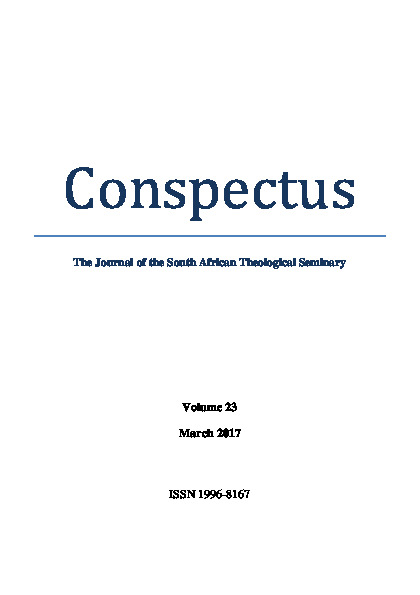Curl, A Critique of the Patriarchalistic Paradigm
The Kingdom of Swaziland is inhabited, in the main, by a people who can trace their ancestry back to a limited number of Nguni clans with a common language – SiSwati. Those belonging to the Dlamini Nkosi clan rule within this hierarchical culture. Swaziland is also said to be a ‘Christian country’ where 80% of the population maintain that they are believers. As such, the country is unique as a case study in which to examine the impact of patriarchalism on the preaching of the Gospel.
Lioy, One Saviour and Two Responses
This journal article undertakes a comparison and analysis of Luke 18:18–30 and 19:1–10. One reason for doing so is the paucity of scholarship exploring the interrelationship between these two texts. A second motivation is that both passages showcase two contrasting responses to the Saviour, one characterized by unbelief and the other by belief. A third incentive for this endeavour is that the importance of believing in the Saviour receives elucidation. As this essay demonstrates, each narrative advances a key theme of the third Synoptic Gospel, namely, that Jesus, the divine-human Son, came to earth to unshackle those enslaved to sin and restore them in their relationship with God.
Irudayaraj, The Sabbath Restrictions in Nehemiah
As one of the three ‘reforms’ that Nehemiah undertakes, Nehemiah 13:15–22 narrates his Sabbath ‘reforms’. In this action-filled self-portrait, Nehemiah paints himself as the safeguarder of the sanctity of the Sabbath (cf. v.22). A New Historical scrutiny of the portrait, however, reveals a twin excess therein: (i) in Nehemiah’s power; (ii) in his novel interpretation of the ‘book of Moses’ (cf. 13:1). Whereas the former provides a reading strategy (interpretive significance), the latter bears witness to the adaptability and survival of texts—both biblical and ours (pastoral significance).
Asumang, Perfection of God’s Good Work
One of the reasons for the demise of the partition theory of Philippians is the identification of several integrating themes running through the letter. It is thus surprising that the repeated occurrence of lexemes and morphemes allied to the concept of ἔργον (work) that is initially broached at the letter’s beginning has not received the deserved attention. This article contributes to the current state of scholarship in three ways. Firstly, it demonstrates that Paul’s expression of confidence as part of his thanksgiving-prayer report, that God who began ἔργον ἀγαθὸν (a good work) in and among the Philippians (1:6) will perfect it by the day of Christ, commences a consistent theme on ‘work’ that spans the letter, and thus further buries the partition theory.
Volume 23
March 2017
Falconer, Review of Atonement for a Sinless Society
Alan Mann works in education, supporting children with complex special educational needs. He is a graduate of The London School of Theology (LST) where he studied for a Bachelor of Theology and a postgraduate course in Hermeneutics and Biblical Interpretation. Mann has worked for a number of UK-based Christian leaders and organisations, and has contributed to numerous books, magazines and online publications. For several years he served as an Open Learning Tutor for LST, specialising in Christianity in Contemporary Culture and Theology of the Poor. He lives in the UK with his family. In addition to Atonement for a Sinless Society,

